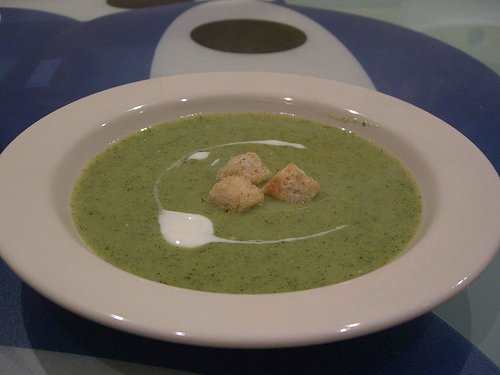American Foods Easy to Find in Japan
Tealparadise is American-born but lives in the mountains of Japan.
Hint: In Japan, You Can Actually Get Most of What You Want
There are two common misconceptions about moving to Japan:
A. You can get anything you could in the US, through the magic of internet
B. You can't get anything you are used to, and you will live on rice and miso for the next five years.
Neither are really true. As someone living in the countryside, and shopping at a mid-sized town, let me tell you what you likely will and will not be able to find.

This cream of broccoli soup might cost you $6 per bowl to make. Cream is jacked, cheese is jacked, and broccoli is too, to a lesser extent.
avlxyz on flickr
More Than Miso
You actually can get most things at your average supermarket. If you can't, there will likely be a foreigners' store in your area. Most things foreigners commonly complain about are actually pretty easy to find. I have found:
- cheese
- peanut butter
- shirts
- chocolate
- mint flavor (popularity is rising)
- pasta of all sorts
- decent Italian restaurants
- Mexican food
- most major spices to make any of these things
So don't freak out. My list of things I haven't been able to get at all is much shorter.
The real sticking point is price. If you've lived on your own for a while and know the prices of things, adjusting to "import prices" can be rough.
Scroll to Continue
Read More From Toughnickel

Fruit and what you could call "decent" chocolate are outrageously expensive. You won't be making this, even if strawberries are in season.
Hans on pixabay
Things That Are Awfully Expensive in Japan
So here's my list of things that are only available at jacked prices. Some of these things you could bring from home, but some are just shogunai (nothing to do about it).
- Broccoli (I eat a LOT of broccoli, other people might not notice this one)
- Chocolate in general
- Baker's chocolate and cocoa in particular
- Cream
- Cheese (you can get it, but you pay through the nose compared to US prices)
- Fruit, except bananas. Don't ask me why. Expect about $1 per piece of fruit at the cheap end.
- Pasta sauces
- Peanut butter - I don't eat much, so I don't notice this.
- Button/crimini/portabella mushrooms
- Clothes
- Gym memberships
- Energy drinks
- Accessories
Now, Japan has its own version of peanut butter which tastes like the fluff was mixed into the jar. It's okay if you like that kind of thing, but for our purposes, we're talking about Skippy being expensive.
Same way with chocolate. You can get it ... but what you can get easily is strange. If you go for Western style, it gets more expensive. Baking is not popular in Japan, due to lack of real ovens, so the baking section is like easy-bake versions of everything. A 3 oz bag of chocolate chips, 10 grams of baking powder, and 1000000000 decorating implements.
If you have the luggage space, I suggest buying some dried mushrooms if you really enjoy the flavor. No one told me that mushrooms were going to be so rare, or so expensive. I guess most people are focused on the cheese and chocolate.
Regardless of all this, I would save most of the suitcase space for clothes if you don't have an Asian body type. Even those of us who are more slim will have trouble finding things that really fit, especially larger busts, wider shoulders, and curvier hips. I do not mean larger hips, but literally curvier. They don't sell clothes that lay well on a ba-donka-donk, so you have to size up, and end up with a sack.
What Should You Bring When Moving to Japan?
If you like these things, throw them in your suitcase.
- Hard cheese, like Romano or Parmesan, that won't spoil during the trip.
- Dried mushrooms.
- Cocoa powder and bakers chocolate, if you want to bake, or just a few mixes.
- Many pairs of pants.
- Underwear.
- Bras.
- Deodorant
- Toothpaste with fluoride, if you use it.
- Flavored coffee creamer. It doesn't exist here—this is one thing you truly can't get anywhere in my area.
- Omiyage, that is, small edible gifts for everyone.
- Any medications you are currently taking that aren't expressly prohibited.
Any Restrictions on What You Can Bring
The handbook I got from JET (Japan Exchange and Teaching Programme) said that you can only bring X amount of Y at a time in your suitcase. After checking the relevant customs rules, I couldn't find anything about such restrictions. There is a "reasonable personal use" clause on everything, meaning you are not supposed to bring enough to sell.
The JET handbook's statement that you can't bring more than one month of medication into the country at a time seems to be false. Sending medication later is expensive and requires paperwork, and going to the doctor is of course no fun. So bring as much of your medication as you need until you get settled. Everyone who isn't on the JET program does that, and no one has had problems. Just don't go crazy and make people think you are dealing meds.
Source: https://toughnickel.com/real-estate/Products-you-cant-get-in-Japan